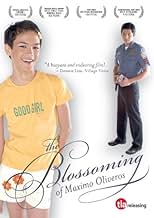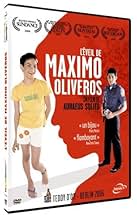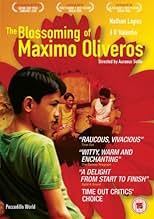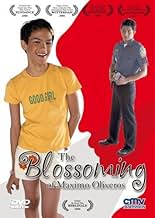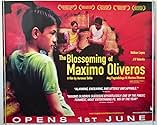IMDb RATING
6.9/10
1.7K
YOUR RATING
A young boy falls in love with a handsome policeman who is investigating his family's criminal activities.A young boy falls in love with a handsome policeman who is investigating his family's criminal activities.A young boy falls in love with a handsome policeman who is investigating his family's criminal activities.
- Awards
- 24 wins & 28 nominations total
JR Valentin
- Victor Perez
- (as J.R. Valentin)
Jett Desalesa
- Leslie - Maxi's friend
- (as Sir Jett Desalesa)
- Director
- Writer
- All cast & crew
- Production, box office & more at IMDbPro
Featured reviews
Is Maxi Gay? Well, he dresses like a girl and has a crush on a hunky policeman. But as the story develops one has to wonder whether Maxi is actually a gay preteen or just a troubled boy in a difficult situation. Does it matter? Not really.
After the death of his mother due to an unknown illness Maxi has taken over her role in taking care of his two brothers and father, all petty thieves. The arrangement seems to work fine. Maxi delights in cooking and cleaning for his family and enjoys a playing Miss Phillipines with his "girl" friends. But everything changes when a hunky young cop arrives. Maxi develops a crush and is forced to choose between his family and his feelings for the cop. Needless to say thinks get complicated and even turn ugly and violent.
This film impressed me when I saw it at a screening at the International Filmfestival Rotterdam. There are faults but mainly the film is strong and well executed. The acting is impressive, although Maxi starts out a bit of a stereotypical screaming queen.
If anything the film is a bit too long, there are several moments that could be deleted without much effect. Also the quality of the picture and sound is understandably not up to western standards, although this does not distract from the story and I have seen much worse.
One of the questions I am left with is whether this accurately portrays Philipine's attitude towards (effeminate) homosexuality. If so that is to be commended, however it is hard to imagine such utter and complete tolerance, not only of Maxi but also of his friends. In a film with such a premise one sort of expects some exploration of the subject. However the lack thereof does not affect the story, it may even make it stronger.
I hope you will go see this movie, if you get the chance!
After the death of his mother due to an unknown illness Maxi has taken over her role in taking care of his two brothers and father, all petty thieves. The arrangement seems to work fine. Maxi delights in cooking and cleaning for his family and enjoys a playing Miss Phillipines with his "girl" friends. But everything changes when a hunky young cop arrives. Maxi develops a crush and is forced to choose between his family and his feelings for the cop. Needless to say thinks get complicated and even turn ugly and violent.
This film impressed me when I saw it at a screening at the International Filmfestival Rotterdam. There are faults but mainly the film is strong and well executed. The acting is impressive, although Maxi starts out a bit of a stereotypical screaming queen.
If anything the film is a bit too long, there are several moments that could be deleted without much effect. Also the quality of the picture and sound is understandably not up to western standards, although this does not distract from the story and I have seen much worse.
One of the questions I am left with is whether this accurately portrays Philipine's attitude towards (effeminate) homosexuality. If so that is to be commended, however it is hard to imagine such utter and complete tolerance, not only of Maxi but also of his friends. In a film with such a premise one sort of expects some exploration of the subject. However the lack thereof does not affect the story, it may even make it stronger.
I hope you will go see this movie, if you get the chance!
10fjgebaue
I saw this at the San Francisco Film Festival... it is really a beautifully done film that has both good laughs and good drama. It is amazing that this film was produced for about $10,000 US and was shot in 13 days in the director's own hometown neighborhood. This film will surprise you with its frankness and honesty, and I can't recommend it highly enough. I've seen plenty of boring and trite or irrelevant films at film festivals. This film is certainly worthy of your time and may change the way you look at poverty, at gay people, and at the nature of families and the love of parent and child, sibling and sibling. It is also a wonderful "barrio" film in the tradition of "Macho Dancer," but I think it does that film one better. I would definitely see this movie once or twice again. It is easily as good as any Hollywood film.
Regardless the controversial topic and my non-knowledge of the reality of those events (for example, volume of corruption within police and acceptance of gays in the Phillippines), as for a film as such, it was skilfully accomplished: good/great performances by major actors, versatile direction and appropriate choice of music made Ang pagdadalaga ni Maximo Oliveros a smooth watch.
Due to limited space and time, however, the film had several documentary elements, and several events happening in the dark did not allow to follow them carefully (perhaps by virtue of modest technology used?). Thus, not a total contentment for me, but definitely a distinguishing and challenging creation to be screened in various festivals.
Due to limited space and time, however, the film had several documentary elements, and several events happening in the dark did not allow to follow them carefully (perhaps by virtue of modest technology used?). Thus, not a total contentment for me, but definitely a distinguishing and challenging creation to be screened in various festivals.
Although the main character is gay, this is not a gay film. The beauty of the film is that it does not make fun of the gay character. Maxi is well-loved and accepted by his family and the community.
There is plenty of humor but this light treatment of the story does not at all trivialize the message that the film wants to bring across to the audience. Scriptwriter Michiko Yamamoto who also wrote the award-winning "Magnifico" has improved her skill in storytelling and is not at all melodramatic this time. She has done away with subplots that don't move the main story much, a weakness of many Filipino scriptwriters who want to tell everything, including the entire history of the Philippines, in one movie. Her characters are all balanced no one is all-evil or all-saint. The most touching scenes are those that show the tenderness of Maxi's tough-guy family to him. However, there are technical glitches that need to be fixed, and with digital technology editing may still be possible, e.g. scenes that are too dark or the screen going black for too long, making the oldies in the audience worry that perhaps the "lagarista" has been caught in traffic with the next roll of film. It is not often that Filipinos abroad get to see a rare gem like this film. Thanks to digital film-making and indie cinema and the film festivals in many countries.
There is plenty of humor but this light treatment of the story does not at all trivialize the message that the film wants to bring across to the audience. Scriptwriter Michiko Yamamoto who also wrote the award-winning "Magnifico" has improved her skill in storytelling and is not at all melodramatic this time. She has done away with subplots that don't move the main story much, a weakness of many Filipino scriptwriters who want to tell everything, including the entire history of the Philippines, in one movie. Her characters are all balanced no one is all-evil or all-saint. The most touching scenes are those that show the tenderness of Maxi's tough-guy family to him. However, there are technical glitches that need to be fixed, and with digital technology editing may still be possible, e.g. scenes that are too dark or the screen going black for too long, making the oldies in the audience worry that perhaps the "lagarista" has been caught in traffic with the next roll of film. It is not often that Filipinos abroad get to see a rare gem like this film. Thanks to digital film-making and indie cinema and the film festivals in many countries.
Though its a thoroughly Catholic-dominated country, the Philippines is said to have a more lax attitude towards "the gay" than other more liberal, democratic countries, like the one I live in. Many point to its cinema as evidence of this. Of course, this is from the outside looking in. LGBT folks, particularly the effeminate "bakla" male, might be commonplace in Philippine film, but the ones we don't see on screen face a particular type of oppression. They are often an object of ridicule, stereotyped as shallow, loud-talking and outrageously "mayabang," and usually sex-crazed. And a lot of folks, gay or straight, eat it up.
Despite its deceptive marketing (from the DVD cover/promo poster to the trailer), Auraeus Solito's Ang Pagdadalaga ni Maximo Oliveros/The Blossoming of Maximo Oliveros (2006) isn't at all about a flamboyantly gay boy's crush on the hunky neighborhood police officer that happens to be set in a third world barrio. The story is the barrio, and all its contradictions, initially dressed up as a neorealist comedy evoking both Lino Brocka and Bagets at once before taking a darker turn halfway through.
Like all good (worthwhile) Philippine stories, its aware of acute third world contradictions without overtly speaking on it. If Brillante Mendoza's work emphasizes people's idealism despite wretched conditions, Solito's flips the formula. His Philippines is one where the people are wretched but the settings, still unmistakably impoverished, can also be a magical, wonderfully pastel-colored place.
Maxi (Nathan Lopez) is 12-years old, gay, and plays surrogate mother to his family of petty thieves: tatay Paco (Soliman Cruz) and his older brothers Boy and Bog. The barrio is his playground, until one night he's assaulted by some knuckleheads. Policeman Victor (JR Valentin) comes to his rescue, and they become friends much to his family's objection. Matters complicate when Boy ends up killing somebody in a botched robbery attempt. Lopez brings remarkable ease to the title character, embodying urban poor Philippines with simplicity and struggle. His selfless need/want to care for others is carried by a fragile balance between a naive confidence of who he is and a growing insecurity of where he is (and where he's heading). He dreams in a bubble in the process of bursting, asking his father "Wala na bang ibang paraan itay?" (Is there no other way, dad?)
On the surface, he's nothing like his macho, gun-toting father. However, beneath the princess demeanor, he is his father's son, perhaps more so than his brothers. Conditions have forced Paco to consider what is more dignified: starving with a factory job, or getting by as a petty thief. Maxi has inherited his father's most lasting trait: a commitment to keep the family together. Or at least fed, clothed and sheltered, even if it means doing the "wrong" thing. Thus, Maxi's "blossoming" has less to do with dealing with his rejected affections for Victor and more with facing down the reality of his family's livelihood.
Restrained by necessity rather than stylistic choice, Solito shows us what could be done with a digital camera, $10,000US and 13 days of shooting. It's a style of film that can never be overdone in the Philippines, where lack of support from the media industry and government and resources forces an organic creativity.
Solito's execution is matched by writer Michiko Yamamoto's (Magnifico, 2003) gift for compact, delightful drama/comedy without teetering to far in either direction. Thanks to this collaboration, Ang Pagdadalaga ni Maximo Oliveros is a leap forward from the gay caricatures we've gotten too used to, and yet another piece of a compelling argument that Philippine cinema isn't all cornball and melodrama. Or, that a movie can still have those elements and not be shitty.
Despite its deceptive marketing (from the DVD cover/promo poster to the trailer), Auraeus Solito's Ang Pagdadalaga ni Maximo Oliveros/The Blossoming of Maximo Oliveros (2006) isn't at all about a flamboyantly gay boy's crush on the hunky neighborhood police officer that happens to be set in a third world barrio. The story is the barrio, and all its contradictions, initially dressed up as a neorealist comedy evoking both Lino Brocka and Bagets at once before taking a darker turn halfway through.
Like all good (worthwhile) Philippine stories, its aware of acute third world contradictions without overtly speaking on it. If Brillante Mendoza's work emphasizes people's idealism despite wretched conditions, Solito's flips the formula. His Philippines is one where the people are wretched but the settings, still unmistakably impoverished, can also be a magical, wonderfully pastel-colored place.
Maxi (Nathan Lopez) is 12-years old, gay, and plays surrogate mother to his family of petty thieves: tatay Paco (Soliman Cruz) and his older brothers Boy and Bog. The barrio is his playground, until one night he's assaulted by some knuckleheads. Policeman Victor (JR Valentin) comes to his rescue, and they become friends much to his family's objection. Matters complicate when Boy ends up killing somebody in a botched robbery attempt. Lopez brings remarkable ease to the title character, embodying urban poor Philippines with simplicity and struggle. His selfless need/want to care for others is carried by a fragile balance between a naive confidence of who he is and a growing insecurity of where he is (and where he's heading). He dreams in a bubble in the process of bursting, asking his father "Wala na bang ibang paraan itay?" (Is there no other way, dad?)
On the surface, he's nothing like his macho, gun-toting father. However, beneath the princess demeanor, he is his father's son, perhaps more so than his brothers. Conditions have forced Paco to consider what is more dignified: starving with a factory job, or getting by as a petty thief. Maxi has inherited his father's most lasting trait: a commitment to keep the family together. Or at least fed, clothed and sheltered, even if it means doing the "wrong" thing. Thus, Maxi's "blossoming" has less to do with dealing with his rejected affections for Victor and more with facing down the reality of his family's livelihood.
Restrained by necessity rather than stylistic choice, Solito shows us what could be done with a digital camera, $10,000US and 13 days of shooting. It's a style of film that can never be overdone in the Philippines, where lack of support from the media industry and government and resources forces an organic creativity.
Solito's execution is matched by writer Michiko Yamamoto's (Magnifico, 2003) gift for compact, delightful drama/comedy without teetering to far in either direction. Thanks to this collaboration, Ang Pagdadalaga ni Maximo Oliveros is a leap forward from the gay caricatures we've gotten too used to, and yet another piece of a compelling argument that Philippine cinema isn't all cornball and melodrama. Or, that a movie can still have those elements and not be shitty.
Did you know
- TriviaJoey Pepe Smith who plays the piano man being teased by the kids is the one who scored the film.
- ConnectionsReferenced in Ako ang simula: The ABS-CBN News and Current Affairs Yearend Special (2006)
- SoundtracksMy Country, My Philippines
Written and Performed by Yoyoy Villame
- How long is The Blossoming of Maximo Oliveros?Powered by Alexa
Details
- Release date
- Country of origin
- Official sites
- Languages
- Also known as
- The Blossoming of Maximo Oliveros
- Filming locations
- Production companies
- See more company credits at IMDbPro
Box office
- Gross US & Canada
- $28,041
- Opening weekend US & Canada
- $6,690
- Sep 24, 2006
- Gross worldwide
- $38,691
- Runtime1 hour 40 minutes
- Color
Contribute to this page
Suggest an edit or add missing content

Top Gap
By what name was L'éveil de Maximo Oliveros (2005) officially released in Canada in English?
Answer
